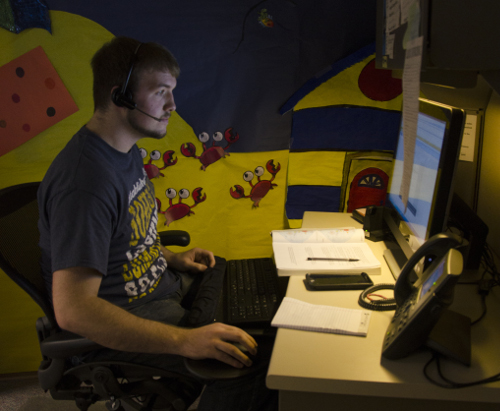Student Ambassadors begin fielding all college phone calls
By Stephen Cook
Callers will now hear a different voice when they contact the college, the voice of a student.
Monday, Jan. 27 marked the first day only students were answering the phones. Prior to the transition that began Nov. 18, two to three operators in the Carlsen Center police department would field all of these phone calls. This meant that the operators had to answer both emergency and general college inquiries simultaneously.
Now, a staff of 12 ambassadors take turns throughout the week answering an average of around 400 to 500 phone calls a day at two operator stations, working 8 to 6 on Monday through Thursday and 8 to 5 on Fridays. Four of the ambassadors were recently hired to help with these duties as well as other responsibilities at the Student Welcome Desk.
Keith Davenport, manager of Student Activities and Leadership Development, said the college made the decision as a step to be more engaging when talking over the phone.
“The college as a whole has been seeing that when students engage other students, it’s much more effective than if a staff person engages a student,” Davenport said. “Students are much more responsive to talking to another student than they are to somebody who is 5, 10, 15, 40 years older than they are.”
Since the students don’t have to worry about police matters while answering general inquiries, Davenport said they will be able to offer better customer service to callers.
Bonnie Hensley, who has served as an operator in the Carlsen Center for the police department for 16 years, said they likewise will be able to focus on improved customer service for emergency and non-emergency calls.
“I’m glad they finally did it,” Hensley said. “There have been absolutely zero complaints on the phone calls because I think they’re getting answered faster and better, so that is a huge, huge plus and the stress level’s gone way down.”
Hensley also helped train Davenport so he could guide the student ambassadors through the transition.
Student ambassador Samantha Skinner said she enjoys her job and doesn’t mind the new duty of answering calls. However, talking on the phone versus in person creates new challenges.
“I get a lot of people calling and then hanging up and then I get really self conscious because I’m like oh they didn’t want to talk to me,” Skinner said. “There’s a lot of cases where you can’t understand the person; they’re mumbling or something.”
Another way the college is working to improve efficiency is through the installation of an automated operator. Through voice-recognition technology, callers can now say the name of the individual or department and the system will automatically collect them. Davenport said they are waiting for the data to see how the new automation affects calls sent through to an operator, since you can only compare to a year before.
Although students were a little apprehensive at first, Davenport said once they start doing it everyone really likes it. There is an aspect of problem solving as operators have to connect callers with the right person on campus.
“The students are already doing a lot of that at the student welcome desk here in the first floor,” Davenport said. “So it’s kind of just taking the same idea and putting it on the phone.”
He said they are also working on some different methods to provide feedback for the call center, such as an online ticketing system.
After the transition, the number of Carlsen Center operators remains the same, although scheduled hours may vary.
Davenport believes it is a great move by the college for callers to hear a student’s voice when they speak with an operator.
“I’m really excited about the impact it’s had and how well the students have caught on,” he said. “They’ve caught on very quickly.”
Contact Stephen Cook, editor-in-chief, at scook35@jccc.edu.






















